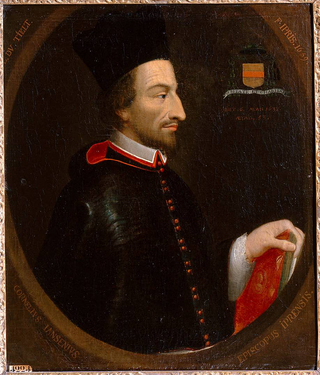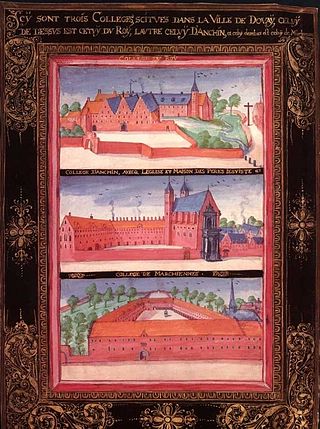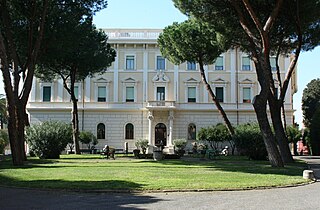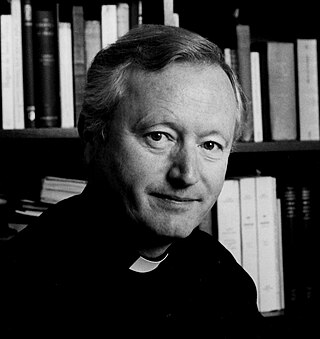Related Research Articles

Jansenism was an early modern theological movement within Catholicism, primarily active in the Kingdom of France, that arose in an attempt to reconcile the theological concepts of free will and divine grace. Jansenists claimed to profess the true doctrine of grace as put forth by Augustine of Hippo. In 1653, Pope Innocent X promulgated the bull Cum occasione, which condemned five errors attributed to Jansenism, including the idea that Christ did not die or shed his blood for all men.

The Catholic University of Leuven or Louvain was founded in 1834 in Mechelen as the Catholic University of Belgium, and moved its seat to the town of Leuven in 1835, changing its name to Catholic University of Leuven. In 1968, it was split into two universities, the Katholieke Universiteit Leuven and the Université catholique de Louvain, following tensions between the Dutch and French-speaking student bodies.

Cornelius Jansen was the Dutch Catholic bishop of Ypres in Flanders and the father of a theological movement known as Jansenism.

Irish Colleges is the collective name used for approximately 34 centres of education for Irish Catholic clergy and lay people opened on continental Europe in the 16th, 17th and 18th centuries.

The University of Douai was a former university in Douai, France. With a medieval heritage of scholarly activities in Douai, the university was established in 1559 and lectures started in 1562. It closed from 1795 to 1808. In 1887, it was transferred as University of Lille 27 km away from Douai.
The formulary controversy was a 17th- and 18th-century Jansenist refusal to confirm the Formula of Submission for the Jansenists on the part of a group of Catholic ecclesiastical personnel and teachers who did not accept the charge that their beliefs about the nature of man and grace were heretical as the Holy See declared. In the Kingdom of France, it pitted Jansenists against Jesuits. It gave rise to French theologian Blaise Pascal's Lettres provinciales, the condemnation of casuistry by the Holy See, and the dissolution of organised Jansenism.

Aodh Mac Cathmhaoil, O.F.M., was an Irish Franciscan theologian and Archbishop of Armagh. He was known by Irish speakers at Leuven (Louvain) by the honorary name Aodh Mac Aingil, and it was under this title that he published the Irish work Scáthán Shacramuinte na hAthridhe.

The Pontifical Irish College is a Catholic seminary in Rome for the training and education of priests. The College is located at #1, Via dei Santi Quattro, and serves as a residence for clerical students from all over the world. Designated a pontifical college in 1948, it is the last Irish College in continental Europe.

The Irish College in Paris was for three centuries a major Roman Catholic educational establishment for Irish students. It was founded in the late 16th century, and closed down by the French government in the early 20th century. From 1945 to 1997, the Polish seminary in Paris was housed in the building. It is now an Irish cultural centre, the Centre Culturel Irlandais.
Monsignor Peter Keenan Guilday American Catholic priest and historian.

The Old University of Leuven is the name historians give to the university, or studium generale, founded in Leuven, Brabant, in 1425. The university was closed in 1797, a week after the cession to the French Republic of the Austrian Netherlands and the principality of Liège by the Treaty of Campo Formio.

Libert Froidmont a son of Gerard Libert de Froidmont and Marguerite Radoux, was a Liégeois theologian and scientist. He was a close companion to Cornelius Jansen and corresponded with René Descartes.

The Old University of Leuven was established in 1425 with Faculties of Arts, Medicine, Law; however, the university did not have a Faculty of Theology initially. In 1426 a Faculty of Canon Law was added, and at that time both Law Faculties functioned together in one Collegium utriusque iuris.
The Dean of Waterford in the United Dioceses of Cashel and Ossory in the Church of Ireland is the dean of Christ Church Cathedral, Waterford.

The Irish College of St Anthony, in Leuven, Belgium, known in Irish: Coláiste na nGael i Lobháin, Latin: Hibernorum Collegii S. Antonii de Padua Lovanii, French: Collège des Irlandais à Louvain and Dutch: Iers College Leuven, has been a centre of Irish learning on the European Continent since the early 17th century. The college was dedicated to St. Anthony of Padua.
Michael O'Riordan was an Irish priest who served as Rector of the Pontifical Irish College, Rome. Born in Killmurray, Co. Limerick in 1857 he attended the Diocesan School in Limerick, before going to Rome to study for the priesthood. He was ordained in 1883 and served as a priest in the Diocese of Westminster, before returning to Rome to study, an accomplished student he gained a Doctorate of Divinity, Doctorate of Canon Law and a PhD. He was appointed Professor at St Munchin's College, Limerick. He was appointed Rector of the Irish College in Rome in 1905. He was awarded an Honorary PhD from the University of Louvain. He was influential between the Irish Church and the Vatican and used his influence to dissuade the Vatican from condemning the 1916 Easter Rising His brother Denis Riordan was a tenant farmer.

James J. McEvoy was an Irish philosopher and priest. His principal academic interests were related to medieval philosophy, particularly the work of John Scotus Eriugena and Robert Grosseteste. He also wrote about the philosophy of friendship.
James J. Ryan was an Irish Catholic priest in the diocese of Cashel, who served as president of St. Patrick's College, Thurles (1903–1914). Ryan also funded the establishment of Glenstal Abbey, inviting the Pallotine order to establish a presence in Thurles, and funded the re-establishment of the Irish College in Louvain. Born in Thurles, Co. Tipperary in 1851, he went to Louvain to train for the priesthood from 1873, ordained in 1876 he was awarded the degree of J.C.B. (Lovan.) before continuing his studies in Rome.
Pierre-Justin Delort, often anglicized to Peter, was a French priest and academic who was exiled following the French Revolution and moved to Ireland. Born in Bordeaux in December 1748. A priest in the Archdiocese of Bordeaux in France, he held a Doctor of Laws from the University of Bordeaux. Delort was a professor of philosophy at the Collège de Guyenne, before the Revolution. Following the revolution, he emigrated to London.
The Irish Dominican College, Louvain or The Irish Dominican College of Holy Cross, was a college in Louvain, in the Spanish Netherlands set up during the Penal Laws to train Irish Dominican priests, to minister in Ireland.
References
- ↑ John Sinnich (1603-1666) by Paul Arblaster, Oxford Dictionary of Irish Biography.
- ↑ John Sinnich La Cultura Italiana
- ↑ A Life John Sinnich www.ricorso.net